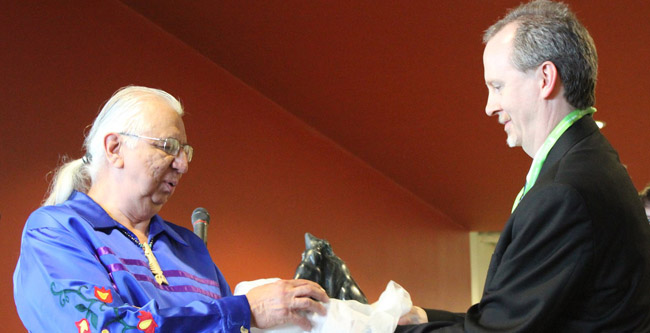First Peoples Studies at Concordia successfully hosted CINSA 2015

By Karl Hele
MONTREAL – For three days in mid-June almost 300 participants attended the relaunching of the annual Canadian Indigenous Native Studies Association conference. The event took place at Concordia University’s downtown campus. Presenters and attendees took in 160 presentations ranging from academic panels, workshops, and films to musical and artistic performances. By scheduling all events into two-hour blocks everyone had the time to engage in conversations that served to transcend the stodgy image of an ‘academic’ conference. Topics covered by the presenters included papers on urban Aboriginals, poverty, two-spirited people, education, treaties, youth, justice, environment, health, literature, residential schools, and an exploration of a variety of ways to tell stories through film, writing, and multimedia.
Talking circles drawing from the Indigenous presence in Quebec were well attended. Quebec-based artists Nadia Myre, Hannah Claus, and Guy Sioui-Durand’s talking circle “Survivance and art in Quebec” explored the many facets of cultural production and its meaning. Another talking circle, “25 Years Since Oka,” proved to be popular among attendees. Kenneth Deer, Laura Norton, and Ellen Gabriel spoke of the event and the overall lack of progress on the land claim, however, they did offer some hope in other areas of relationship between Haudenosaunnee and Quebecers. Deer reminded everyone that from the Mohawk perspective this was the ‘Canadian Crisis’. Lawyer David Schulze and Vice-President of the Commission des droits de la personne et des droits de la jeunesse, Renée Dupuis also offered insight into the Oka Crisis and the decade and a half since. A Kanehsatà:ke based group called Carrying Our Roots to Empowerment, spoke of its efforts to empower community and individuals. Finally, a talking circle focussing on murdered and missing women drew attention to and generated discussion surrounding Indigenous women in Quebec.
A very timely performance called “Apology Dice: An Interactive Performance Concerning The Indian Residential School Apology,” undertaken by Clement Yeh (David Garneau was unable to attend), generated discussion around the concept of ‘apology’. Participants were asked to roll the dice, which were engraved with various words or phrases designed to invoke an emotional response and generate discussion. The idea behind David Garneau and Clement Yeh’s dice is to start conversations while furthering the idea of reconciliation.
In addition to the focus on Quebec, a number of presenters from Ontario attended the conference. Presenters on the second day of the conference, such as Paul-Emile McNab discussed Henry Ford and Walpole Island First Nation’s complex relationship, while David McNab spoke about the efforts of Metis man, William Kennedy, to find the Franklin expedition. Garden River First Nation member and Trent graduate student, Leslie Belleau, attended with her newborn to speak about Indigenous feminism and stories. On the third day of the conference a panel of three graduate students from the University of Toronto explored resistance and survivance of the Metis after the 1850 Robinson Treaties (Jennifer Hayter); the aims and goals of those who negotiated those treaties as well as government failure to follow through (Zachary Smith); and the imperious roles of Indian Agents on the St. Regis Reserve as well as Haudenosaunee reactions (Chandra Murdoch).
In addition to all the presentations, conference participants were invited to attend a reception on 11 June in the honour of Kenneth Deer, Honourary Doctorate recipient from Concordia University, where all were entertained by Inuit throat singers Itaqralik Partridge and Nina Segalowitz as well as by Mohawk rappers the Beat Vandalz. A feast for attendees on 12 June was followed by a keynote address from Anishinaabeg writer and humourist Drew Hayden Taylor entitled “Whitewater Canoeing Dow the Rapids of Native Humour.” He had also undertaken a workshop the day before. Both the keynote address and prior workshop were well attended and greatly enjoyed by all.
The 2015 CINSA conference wrapped up on 13 June with a few judicious words from the Chair of the organizing committee, Dr. Karl Hele, as well as Concordia’s elder in residence Morningstar. It was also announced at that time, that the 2016 conference will be hosted by First Nations University, the 2017 conference by BAUP in Puebla, Mexico, and the 2019 Conference by Trent University. CINSA executive members are entertaining proposals from any organization seeking to host the conference in 2018. Overall the 2015 CINSA conference at Concordia successfully relaunched the annual conference – great food and great discussions took place as old friends and colleagues reunited while making new friends and colleagues over the course of three days. Chi Meegwetch to all those who attended and to our sponsors.


